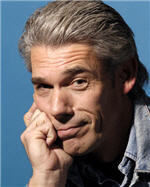A GRIM REMINDER
On Thursday I was travelling west on Rte. 93 in Manchester approaching the South Willow Street exit. It was a little before noon, I think, and I saw a sea of brake lights ahead of me. I travel this road everyday, and have seen times where an accident on the overpass will snarl things up, but this traffic jam was different. Folks were lined up on the shoulder for over a mile, yet I couldn't see any sign of trouble on the bridge, and, even more odd, nobody was darting out of line, exasperated, and pulling back onto the freeway. "That's some strange kind of back-up", I thought to myself, half expecting to see Rod Serling step out from behind a parked vehicle and begin introducing "The Twilight Zone". Why, I wondered, would anyone in their right mind continue to sit in that line of cars, knowing it will be, probably, at least an hour to travel that single mile?
I was perplexed at the sight for several minutes, noting that the ramp in the other direction was equally swamped, with folks just kind of inching along. Is this an alien invasion? Has it finally happened? Is it an army of folks who voted for Obama, now parading to some huge punchbowl filled with Jim Jones Kool-Aid?
Moments before my head was about to explode, the local news came on the radio. As it turns out, WMUR had sponsored, as part of their ongoing "Project Economy" series on their newscast, a Job Fair at Southern New Hampshire University, and they were busing people from the Mall of New Hampshire(on South Willow Street), to SNHU. There were reported to be 140 companies set up at the fair who were looking to fill some 1,500 jobs. Organizers had expected 3,000 - 4,000 people. Over 10,000 showed up.
Even for the noon newscast, they had interviews with people waiting in line. The sound bites were, in a word, heartbreaking. Men and women who had travelled from far away, resumes in hand, dressed and groomed, ready to put their best foot forward. One man was clearly choking up as he described his disappointment. "By the time I get there, it will be over. We are about to lose our home..." Another woman described how she had arranged childcare, barely able to scrape together the money for it, and had "high-hopes" hanging on this event. She, too, felt she would not make it in time. The fair was scheduled to end at 3:00 PM, but shuttles were to be shutoff at 1:40PM. Traffic was gridlocked. The university was packed well beyond its 2,500 person capacity.
It was a grim reminder of where we are at. It also demonstrated the graphic difference between a bar graph in a newspaper, and a sea of actual faces. You could sense desperation in the air. It was frightening, too, in some ways. It was a mob. A good mob, to be sure, but a mob nonetheless, and an emotional one.
The sight of this hung with me through the day, and beyond. I realized, more than I already do, how fortunate I am to be working. While my business has slowed, and a layoff is not out of the question, I am still working, and grateful for the fact.
It also struck me, in profound terms, how we are an increasingly split culture. These were proud Americans, going this far out of their way to find a job. Not a hand-out. Not a government-funded bailout. Just a job. Like the one they probably already had, and lost. They are the truly invisible, because they're not sleeping on park benches(yet), or standing on corners with a cup in their hand. They wouldn't have it. But they would endure a day like this, full of stress, anxiety, hope and disappointment, and probably do it again tomorrow and the next day on behalf of their families, their homes, their lives, and not least of all, their pride.
They don't usually make headlines, because good people don't, but Thursday, the truly invisible made an impressive point. They didn't even mean to do it, but they did. Anyone who witnessed that scene must honestly know, we've got a long, long way to go to get this economy out of the tank. That, of course, assumes that we can.
 Karl From New Hampshire
Karl From New Hampshire